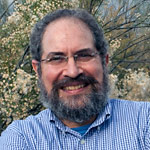Richard Wiener, Ph.D., is a program director at Research Corporation for Science Advancement. Dr. Wiener also currently holds an appointment as an adjunct professor of physics at the University of Arizona, and he is a member of the Editorial Board of the Forum on Physics and Society at the American Physical Society. Previously, Dr. Wiener was a physics professor at Pacific University in Oregon and Chair of the Division of Natural Sciences. He earned his doctorate in physics at the University of Oregon under the direction of London Prize Laureate Russell Donnelly.
Unrivaled wildlife and wondrous desert plants surround Richard Wiener’s home in Tucson, Arizona. But when he looks at pictures of the area from 50 years ago, Wiener laments the destruction that that has occurred within in his own lifetime: “It can be disheartening to ponder the effects of population growth and consumption and resource extraction and to witness losses in habitat,” he reflects. Although he is realistic about the immense environmental challenges we face in the twenty-first century, Wiener envisions vital roles for science and science-based policies in halting environmental destruction and overcoming the problems of resource depletion.
Philosopher turned scientist
Worries about population growth during the 1970s when Wiener was in high school got him asking big questions at the intersection of the environment, the economy, and the availability of resources early on. After earning a Bachelor’s degree in philosophy at the University of California, Berkeley, he joined a forestry cooperative to search for pragmatic answers: How can we develop a more environmentally sound society? How do we use the tools of economic democracy to implement more evidence-informed, sustainable policies?
Wiener had always been interested in science, as well as philosophy, and following several years practicing democratic self-management in the forestry cooperative, he went back to school for his Ph.D. In graduate school, he studied nonlinear dynamics and pattern formation in fluids. He wanted to understand how relatively simple systems in the lab and in nature can display more complex behavior when driven far from equilibrium, such as when temperature gradients cause a fluid to form dynamic convection patterns.
One of the outcomes of his research was the development of nonlinear models that help better understand peak oil. Wiener explains, “When an oil field is developed, the peak of production occurs when about half the oil has been extracted—and then it’s downhill from there.” His models show peaking and declining even when the number of wells drilled in a given field is increasing. “The whole issue of oil production,” he stresses, “is very complicated because there’s a lot of oil in the ground that’s not accessible—but then technology improves and it becomes accessible. There are frequent changes in methods for extracting fossil fuels, but these models, although vastly simpler than the real world, give some insight into what’s going on.”
Advocating for science-based policies at the state level
For Wiener, science represents a model for democracy: “The most democratic thing about science,” he contends, is that “any result is subject to being questioned and investigated by others, and you have to justify your results with evidence. It doesn’t matter who you are. If your results don’t stand up to scrutiny, they don’t hold.”
Outside the lab, though, justifying the evidence to policy makers can be trickier. At Research Corporation—a nonprofit private foundation that funds innovative science and supports the advancement of America’s scientific and technological competitiveness—Wiener spearheads efforts to fund high risk/high reward basic research on solar energy conversion, with the goal of fully realizing the potential of renewable energy. Arizona, for example, has tremendous resources of solar energy, receiving around 300 days of sunlight a year, but it is largely underutilized. “We need more fundamental research, and we also need policy changes that are going to recognize the importance of solar energy,” he explains.
Teaming up with colleague Dick Powell, former vice president of research at the University of Arizona, to develop the Arizona Clean Energy Vision, Wiener has advocated for statewide policy changes that would allow Arizona to generate all its electricity from renewables by 2040. “We have to have better policies,” he says, “and hopefully get on a path that’s more sustainable.” To give the public and policy makers a better understanding of the feasibility of 100% electricity from renewables, the two scientists analyzed scenarios illustrating how this can be achieved by 2040. They promoted their findings and the importance of increasing state standards for solar energy, and received area media coverage, including a story on a local PBS station. “It’s important for scientists to be visible and argue for what’s possible,” according to Wiener.
Science for a better society
“I think that the great virtue of science,” Wiener asserts, “is approaching the world rationally. The greater the ability people have to understand and analyze data … I think that puts us in a better position to address policy and to come up with better solutions.”
Wiener finds particular hope for the future in the large number of early career scientists now tackling fundamental research questions in solar energy conversion with the potential for important, long-term results. One of his key objectives as a program director at Research Corporation is to foster interdisciplinary collaborations and build networks of scientists working to solve energy issues. “My favorite part of my career,” he reflects, “is the opportunity to interact with really smart and passionate people who believe that working in science can make the world a better place.”
